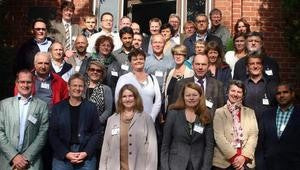The challenges facing IPM implementation in Europe
Around 50 participants gathered in Berlin, Germany, for the first workshop of the C-IPM ERA-NET, with the aim of identifying key challenges facing the implementation of Integrated Pest Management (IPM) in Europe.

October's workshop brought together participants representing policy makers, agricultural advisers, government officials, research and development organisations, researchers and stakeholders from 14 European countries to identify and address long-term needs and strategies for national and transnational IPM research programmes and to ensure the emergence of cutting edge, far-sighted and innovative approaches.
Four core approaches were addressed by the workshop (policy, market, climate change, and research and innovation), with presentations from experts addressing the first three. These presentations can be viewed on the C-IPM website. The workshop then tackled four key questions with regard to these topics and their potential role as a driving force for IPM implementation in Europe:
- How will pesticide policies, including the Common Agricultural Policy (CAP), affect the availability of plant protection products in the EU and how can IPM mitigate possible side effects?
- How will climate change affect the distribution and impact of native and invasive pests in agriculture and does IPM have a role to play in mitigating the negative effects of climate change?
- Do retailers have a role to play in distributing knowledge and interest in IPM among consumers? Will the preferences of consumers influence the implementation of IPM in the future?
- What is the role of research and knowledge transfer for advisers and farmers in the adoption of IPM?
These were addressed using a 'world café' approach, whereby participants were divided into four groups, discussing and drawing conclusions for a specific question before rotating and addressing the following question, thereby allowing all the groups to address all the questions.
With regards to policy, there was general agreement that the number of available pesticides will continue to decrease in the near future as a consequence of European Union pesticide policy. This will increase the demand for alternative solutions and willingness to implement IPM. However, farmers could face major problems if pesticides are removed faster than IPM guidelines can be developed. Participants believed there are initiatives in the CAP which could promote the implementation of IPM measures, even though IPM implementation is not part of the CAP.
For the full article from SeedQuest click here.
